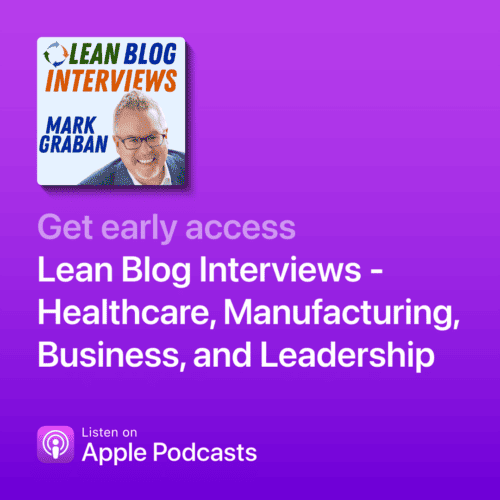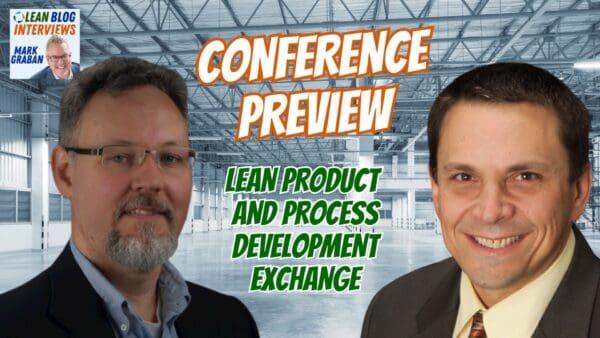Scroll down for how to subscribe, transcript, and more
My guests for this bonus episode of the Lean Blog Interviews Podcast are Geoff Neiley and Andrew Wagner, talking about the Lean Product & Process Development Exchange (LPPDE). Geoff serves as the chair of the upcoming conference, and Andy is the co-chair. Both are also board members of LPPDE.
We're talking about the LPPDE North America Conference 2025, which will take place October 27-30 in Milwaukee, Wisconsin. This annual gathering brings together Lean practitioners, engineers, leaders, and innovators to share experiences and learn how Lean principles can be applied to product and process development.
In this conversation, Geoff and Andy share:
- The origins of LPPDE and how it has evolved since 2008
- Why Lean thinking is just as critical in design and development as it is in manufacturing
- Stories from their own Lean journeys
- What attendees can expect at the 2025 conference, including keynotes, workshops, and networking opportunities
If you're interested in innovation, continuous improvement, and creating better systems for developing products and processes, this event is a great place to learn and connect.
Use code LEANBLOG for 20% off registration
Related episodes: Jim Morgan on Lean Product Development
This podcast is part of the #LeanCommunicators network.


Full Video of the Episode:
Thanks for listening or watching!
This podcast is part of the Lean Communicators network — check it out!

Automated Transcript (Not Guaranteed to be Defect Free)
Mark Graban: Hi, it's Mark Graban. Welcome to Lean Blog Interviews. We're doing a bonus episode. We've been doing a lot of these recently where we are highlighting some of the events happening in the lean community. Today we're going to be talking about the Lean Product and Process Development Exchange. The LPPD, North American Conference 2025 is being held in Milwaukee, October 27th to October 30th. If you'd like to register with 20% off, you can use the code ‘leanblog'. Check the show notes for the links there. We are joined today to talk about the conference by Geoff Neiley and Andrew Wagner. Geoff is the chair of the conference, Andy is a co-chair, and they are both board members of LPPD. So Geoff and Andy, welcome to the podcast. Thanks for joining us. How are you?
Geoff Neiley: I'm doing well.
Andrew Wagner: Yeah, doing great. Long time listener, first time caller.
Mark Graban: Thank you. Long time commenter. Andy, it's good to have you here on the podcast. We have Coast to Coast representation, Boston area with Geoff, and Andy out in the Seattle area. So let's talk about the event, LPPD, Lean Product and Process Development. Geoff, I'd love to hear your thoughts. If you could give us an overview of that.
Geoff Neiley: First Mark, thank you very much for hosting us. It is a pleasure and an honor to be on your show. LPPD is a nonprofit organization that strives to bring the ideas of lean and reducing waste in product development and the processes we use. We try to do that through this exchange. We want to get people together and share our learnings with the attendees, and we want to learn from attendees. LPPD has been around since 2008 and it was founded by some early leaders like Durward Sobeck, Jim Morgan, and Catherine Radeka. Some of these people started LPPD, and I was fortunate to be invited on the board about six years ago. I joined the board because I was a regular attendee for several years at LPPD. My company's Lean Journey started with one of these conferences, and I want to give back and continue to learn as I attend our conferences.
Mark Graban: And you mentioned Jim Morgan. He's been a guest on this podcast twice, so I would invite people to search in the podcast feed. One episode was maybe 15 years ago, and then more recently Jim was back here on the show. Andy, what would you add to some of the context and the background of LPPD?
Andrew Wagner: I think when we try to translate lean from production or manufacturing into product development, there's a tendency to think about things like first-pass quality, because that's a key lean tenet. First-pass quality for product development is really about first-pass learning. That fast-to-fail mindset is a piece of it, but it's really about how you learn quickly. Then, how do you capture that knowledge in a reusable form so that you don't have to go back and learn it all over again? Those are some of the key insights I got out of Jim Morgan's work. Allen Ward is another one of the thought leaders in this space, and then of course, Durward Sobeck is still with us and still part of the organization. That's what excited me: understanding that there are some specific things that are different between production lean and lean in product development. The underlying principles are exactly the same, but how you implement them and how you view them is just a little bit different, and that's why the extra conversation is really important.
Mark Graban: This is not my area of expertise, but it seems like there are applications in so many different industries. I started in the auto industry 30 years ago this year, and as lean was becoming popularized, part of the story was not just about production quality and production lead times, but product development cycles in the auto industry. It was roughly five years for the Detroit automakers and maybe half of that for Toyota and Japanese automakers. I don't know how that stacks up today.
Andrew Wagner: I don't either. You've talked a lot about your experience with NUMI graduates in General Motors. One of the first presentations, the first keynote of my first LPPD conference, talked about how those GM leaders were able to learn those lean techniques at Toyota with a Toyota product. Then they went to their GM factories and found that a lot of it didn't work. It's because the underlying design wasn't as mature in the ways it needed to be in a General Motors car. That product development piece of it is so critical.
Mark Graban: So, we're looking at development time. When it comes to quality, I think one element, again, thinking back to my General Motors days, was poor handoffs between product design and production. You think about things that are studied and taught, like design for manufacturability. Is that quality component also part of the focus? I see you both nodding your heads.
Geoff Neiley: Oh yeah, it's integral and is core to it. In our conferences, we really try to bring in practitioners. We're not a bunch of consultants. I work for a company called Rapiscan Systems. We make x-ray systems for the security market, so I do product development every day. A core tenet of our product development process is this concurrent engineering, where we're constantly, right from the beginning, asking operations, ‘How do you want to build this product? What is your value stream map?' The engineers start with a picture of what the operations team wants, and we try to design to achieve that. We do it with our suppliers as well. So yes, certainly working concurrently with the manufacturing organization, trying to achieve the cost targets with suppliers, labor times, and material movement is a key tenet of that lean product and process development.
Andrew Wagner: The acronym's a mouthful, but product and process development is key, right? That's right.
Mark Graban: I think one common thread to broader lean thinking, lean manufacturing, or lean healthcare even, is the cultural aspects. The LPPD website touches on this: cultural aspects, not just tools. That was a big part of what I learned from the former NUMI leaders that I was able to work for. Andy, first maybe, how would you describe some of those cultural elements, things that might be familiar to those of us from outside of product development?
Andrew Wagner: Well, one of them is just organizational change. There are a lot of deeply ingrained patterns and ways we do product development, so organizational change is a key part of what we discuss in the presentations. We talk about that change journey to get your organization from point A to point B. Another thing we talk about is really creating that learning culture–the PDCA cycle, the scientific method. What we're doing in product development is executing those learning cycles. That's something where I see the strongest tie-in to lean manufacturing, lean generically.
Mark Graban: You're talking about that iteration, and you mentioned earlier the idea of ‘fail forward' or ‘fail early, fail small' and then improve. There has to be this cultural aspect, I imagine, of not punishing these failures.
Andrew Wagner: Absolutely. We try to celebrate them. The point is to learn, so if you've learned what doesn't work, then you have learned.
Mark Graban: Geoff, what would you add to the cultural aspects of LPPD?
Geoff Neiley: What we try to do is take it beyond just one person learning. If I'm going to learn, even if it's a mistake, can everyone in my organization learn it? Can we record it so that it's easily accessible, so we don't have to learn that mistake again? One of the things I got from Jim Morgan at a conference maybe six years ago is this idea of a regular meeting of each engineering discipline. I can't remember what he called it, but I started it after the LPPD conference where he told me about it. We get the mechanical engineering team together–we call it ‘Show and Tell'–and every two weeks we get together and say, ‘What have you learned this week?' I'm working on different projects than the person next to me, so they may not know or have a chance to learn from me, and they may not be able to have a voice to help me. This is, again, what Jim Morgan did at Ford. He wanted to build ‘towering technical competency.' So I would say that's an aspect of culture that we've implemented here, based in that lean culture.
Mark Graban: We call it ‘Kaizen Friday' where I work, sharing those lessons learned and debriefing with each other. We do a lot of that within KaiNexus, a software company, in a Friday all-hands meeting, sharing lessons learned and in some cases even sharing mistakes for the benefit of sharing and learning. It's not the only way to learn, but it's good to have a culture where learning is the focus.
Mark Graban: Speaking of learning, there are lots of opportunities to learn and to network in different ways at conferences. So again, the North American Conference 2025 in Milwaukee, October 27th to 30th. You can save 20% using code ‘leanblog'. What in particular are you excited about for this year's conference?
Geoff Neiley: The theme of the conference is ‘Accelerate Knowledge, Accelerate Innovation.' We're trying to emphasize that the faster we learn, the faster we can innovate. At this conference, we're showcasing discussions about how we're using existing knowledge, how we're creating new knowledge, and especially how we're using AI to capture and accelerate the knowledge that we need to make decisions behind our innovations.
Mark Graban: Andy, what are you looking forward to in particular this year?
Andrew Wagner: In addition to the base content of the conference, they have workshops before and after, which is an add-on. One of the ones I'm involved with is on developing what we call a ‘Lean Learning Plan,' which is a method where we look at the decisions required to develop a product, the sequence they need to happen in, what the knowledge gaps are, and then how you execute experiments to close those knowledge gaps. I learned about it probably two years ago, and now I'm helping to facilitate a workshop on it, which is a great example of the learning and the community that we get from LPPD. This approach–and I know it's a tool as opposed to culture–is a way of solving the problem around how we get the team working together and focused on the really important parts of the problem to solve. So to me, yes, it's a tool, but it's a tool that helps with a big cultural problem in product development.
Geoff Neiley: If I could comment, Andy points out a good point I wanted to make, which is that the workshops, especially that Monday workshop, are, I believe, the most valuable opportunity for people with LPPD. From my experience and my company's experience, that workshop is what kicked off our Lean Journey 11 years ago, and we're still on it today. My personal story was I didn't go to that one 11 years ago; I went the year after but I skipped the workshop and just went to the conference. The morning of the conference, all anyone was talking about was the workshop. From then on, I've never missed a workshop. The workshops on the first day are instrumental. They're really where you get some deep learning. The conferences are great; we like to say you can polish and sharpen your skills at the conference. But you can get some real, deep learning with your peers, learning from peers, and learning from the practitioners and the experts at the workshops.
Mark Graban: Well, I hope people will check that out. Again, the link to the website will be in the show notes. It's lppde.org, correct?
Geoff Neiley: That's correct.
Mark Graban: All right. We've been joined by the chair and the co-chair Geoff Neiley and Andrew Wagner. Thanks for joining us on the podcast.
Geoff Neiley: Thank you very much for having us, Mark.
Andrew Wagner: We appreciate it.
Please scroll down (or click) to post a comment. Connect with me on LinkedIn.
Let’s build a culture of continuous improvement and psychological safety—together. If you're a leader aiming for lasting change (not just more projects), I help organizations:
- Engage people at all levels in sustainable improvement
- Shift from fear of mistakes to learning from them
- Apply Lean thinking in practical, people-centered ways
Interested in coaching or a keynote talk? Let’s talk.
Join me for a Lean Healthcare Accelerator Trip to Japan! Learn More










